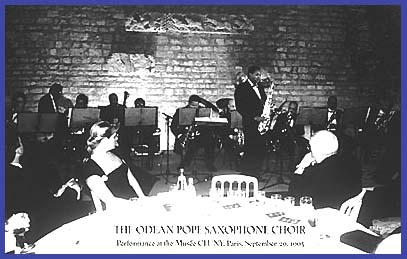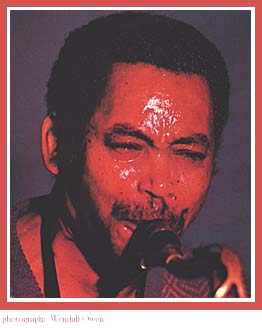Artists I have performed with ~
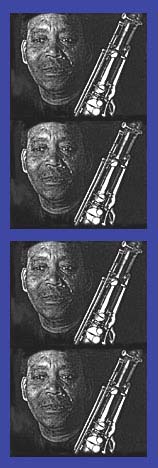
Sam Rivers, Mickey Roker, Archie Shepp, Grachan Moncur,
Bobby Durham, Clark Terry, Tooty Heath, Lee Morgan,
Billy Paul,
Al Grey, Chet Baker, Jimmy DePreist,
John Coltrane, McCoy Tyner,
Jimmy Garrison,
Elvin Jones, Rachell Ferrell, Grover Washington,
Reggie Workman, and Jimmy Smith.
Odean Pope moved from South Carolina to Philadelphia at age ten. Both his parents were musicians, and he soon grew to take part in the cityís active music scene, working as a saxophonist for soul and r&b bands that came to town, including Stevie Wonder, Gladys Knight, and the Temptations. He played with such jazz greats as Clark Terry, Dizzy Gillespie, and Jimmy McGriff. The legendary piano player Hasaan Ibn Ali was a main influence on the young Odean. He started working with drummer Max Roach as early as 1957, and in the 1980s came to prominence as a member of both the Max Roach Quartet and the Max Roach Double Quartet.
 Odean Pope was a music director for the Model Cities Cultural Arts program (1971 - 1976), conducting the orchestral music for the full length ballet Orpheus (1973) with the Arthur Hall Afro-American Dance Ensemble. For many years Mr. Pope has been active as an artist in residence in schools and colleges, receiving many honors and awards for his teaching and his performances. In 1992 he received a Pew Fellowship in the Arts and a commission from the Rockefeller Foundation.
Odean Pope was a music director for the Model Cities Cultural Arts program (1971 - 1976), conducting the orchestral music for the full length ballet Orpheus (1973) with the Arthur Hall Afro-American Dance Ensemble. For many years Mr. Pope has been active as an artist in residence in schools and colleges, receiving many honors and awards for his teaching and his performances. In 1992 he received a Pew Fellowship in the Arts and a commission from the Rockefeller Foundation.
Some very fine tenor saxophonists have come from Philadelphia, men like Benny Golson, Jimmy Heath, John Coltrane, and Grover Washington, Jr. Odean Pope continues in this great tradition. Indeed, his first big break was a gig inherited in 1955 from his friend and mentor John Coltrane, also a Carolina native moved to Philly. "When Coltrane went with Miles, he gave me his gig with Jimmy Smith at a club downtown, Spider Kellyís. He gave me a lot of encouragement," recalls Mr. Pope.
Popeís music always speaks of a deep soul combined with a sophisticated intellect. As a composer, he sometimes works with odd or shifting meters, but in doing so, he obtains strong and true emotions. As a player, he has techniques which incorporate both the traditional and the experimental, including multiphonics, clusters of overtones produced by false fingering, and circular breathing, a technique common in Africa and Asia, urging blurs and bleats of sound with a unique sonority. "I tried to imagine," Pope once said, "what it would sound like if I played at the bottom range of my instrument like Coltrane played the top."
"I think what I got from John the most was dedication and consistency," he says. For many years, Odean has been concentrating on just two musical formats -- the trio and the saxophone choir -- with the latter being closest to his heart, perhaps because it is closest to his earliest musical influence, the Baptist church of a small South Carolina town. "From my earliest memory, it was always a lot of big choirs and a lot of singing." The trio offers the raw, compressed essence of the music, while the choir offers all the range of a big band, a saxophone orchestra, and a gospel choir. As a leader, Odean Pope sticks to these two formats only, and that tells you a lot about this artistís dedication and consistency.
~ Hans-Jurgen Schaal, notes for ninety-six (February 1996), and
~ Kirby Kean, Down Beat (June 1996)


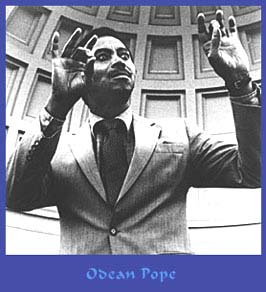
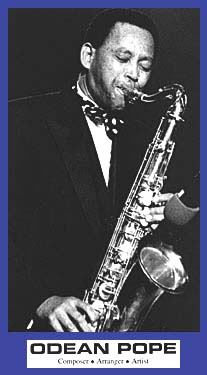
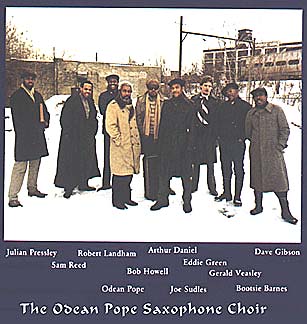
 Pictures in a Frame
Pictures in a Frame
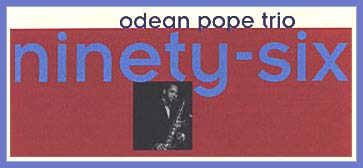
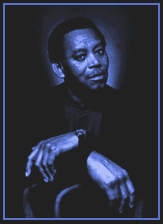 Alaine Brunet, La Presse
Alaine Brunet, La Presse